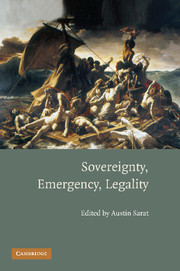Book contents
- Frontmatter
- Contents
- Contributors
- Acknowledgments
- Introduction: Toward New Conceptions of the Relationship of Law and Sovereignty under Conditions of Emergency
- 1 The “Organic Law” of Ex Parte Milligan
- Comment on Chapter 1: David Dyzenhaus, “The ‘Organic Law’ of Ex Parte Milligan”
- 2 Emergency, Legality, Sovereignty: Birmingham, 1963
- Comment on Chapter 2: “Order” in the Court
- 3 The Banality of Emergency: On the Time and Space of “Political Necessity”
- Comment on Chapter 3: Emergencies, Body Parts and Price Gouging
- 4 The Racial Sovereign
- Comment on Chapter 4: Toward a Nonracial Sovereign
- 5 Should Constitutional Democracies Redefine Emergencies and the Legal Regimes Suitable for Them?
- Comment on Chapter 5
- Index
Comment on Chapter 4: Toward a Nonracial Sovereign
Published online by Cambridge University Press: 07 May 2010
- Frontmatter
- Contents
- Contributors
- Acknowledgments
- Introduction: Toward New Conceptions of the Relationship of Law and Sovereignty under Conditions of Emergency
- 1 The “Organic Law” of Ex Parte Milligan
- Comment on Chapter 1: David Dyzenhaus, “The ‘Organic Law’ of Ex Parte Milligan”
- 2 Emergency, Legality, Sovereignty: Birmingham, 1963
- Comment on Chapter 2: “Order” in the Court
- 3 The Banality of Emergency: On the Time and Space of “Political Necessity”
- Comment on Chapter 3: Emergencies, Body Parts and Price Gouging
- 4 The Racial Sovereign
- Comment on Chapter 4: Toward a Nonracial Sovereign
- 5 Should Constitutional Democracies Redefine Emergencies and the Legal Regimes Suitable for Them?
- Comment on Chapter 5
- Index
Summary
Professors Cho and Gott's article, “The Racial Sovereign,” makes a powerful argument that both sovereignty and national security are racially contingent and racially subordinating concepts. In this brief commentary, I would like to offer some thoughts that both complement and supplement their work.
Complements: Of Theorists, Philosophers, and Commentators
As Professor Angela Harris has observed, “Race … has long been central to the exercise of sovereign power in the United States.” In “The Racial Sovereign,” Professors Cho and Gott trace the sovereign's historic use of the emergency power to subjugate Native Americans, African-Americans, Asian-Americans, and its current extension to Arab-Americans, Muslims, and Latino/as. Although their paper is well supported, it could be complemented by the works of additional commentators – some less conventional, but others who, in fact, are planted firmly in the traditional binary framing of sovereignty and emergency that Professors Cho and Gott seek to reject. In some instances the commentator's additional support is express, while in other instances it requires inferential links, but the support is there nevertheless.
Historically, a particularly prominent theorist and philosopher in the traditional study of sovereignty and emergency is Michel Foucault, who expressly discussed race and the sovereign in his work.
Foucault
Michel Foucault, perhaps the most prominent French philosopher of the 1970s and 1980s, discussed race and the sovereign in an express and direct manner that both parallels and encompasses Professors Cho and Gott's work – a somewhat surprising commonality of viewpoints that might not ordinarily be expected of a French philosopher and a critical race scholar. However, a brief overview of some of Foucault's work illustrates the point.
- Type
- Chapter
- Information
- Sovereignty, Emergency, Legality , pp. 228 - 239Publisher: Cambridge University PressPrint publication year: 2010



